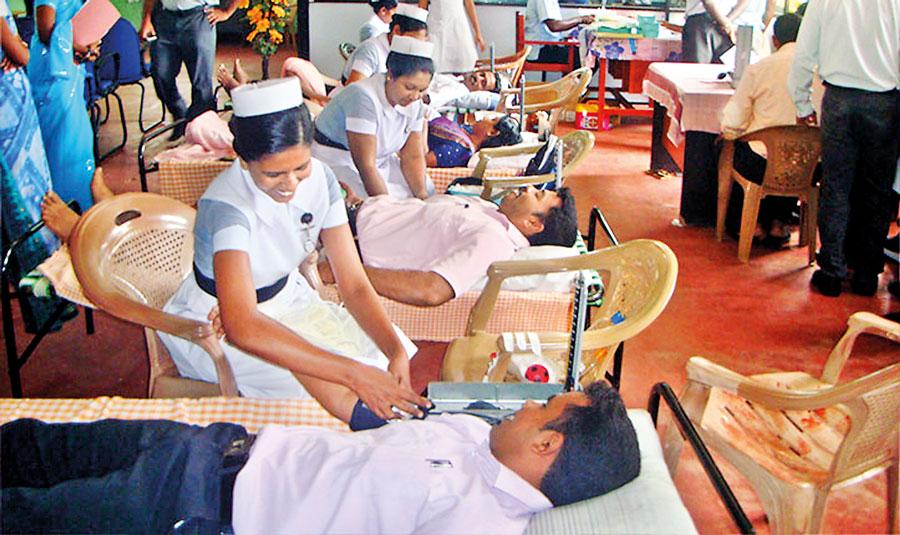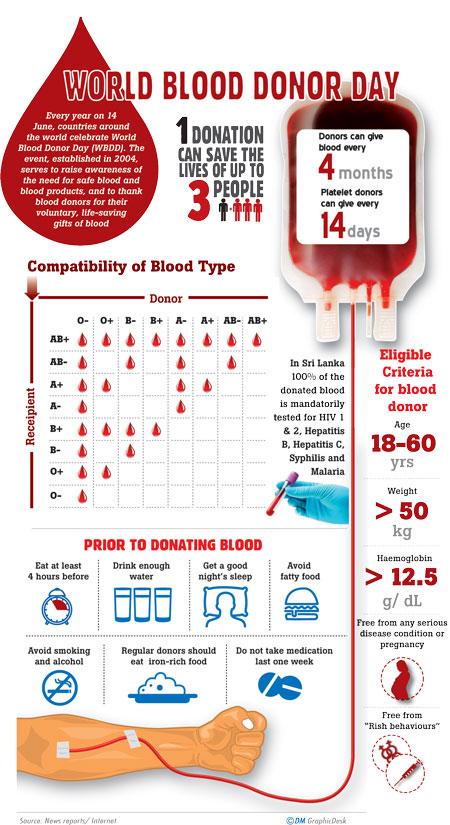Today is World Blood Donor Day


June 14, is the birthday of Karl Landsteiner, an Austrian physician, biologist and Nobel Prize recipient, who discovered and classified the ABO blood groups at the turn of the 20th century. It’s an important day in the world health calendar because Landsteiner’s discovery gave doctors the ability to transfuse blood from one patient to another, and thus saved countless lives. Every year since 2004, the World Health Organisation (WHO) celebrates the World Blood Donor Day and making it a platform to thank voluntary, unpaid blood donors for their life saving gift of blood. The event is also observed worldwide to raise awareness on the need for regular blood donations. Health Capsule spoke to Dr. Chrishanth Silva, (MBBS DFM FCGP) to discuss the importance of blood donation, raising awareness and what makes a healthy donor. .
What purpose does this event serve ?
Before blood transfusions became a regular medical practice, lives were regularly lost as a result of an inadequate blood supply. This event raises awareness in the world of the need for safe blood and blood products to ensure that all individuals and communities have access to affordable and timely supplies of safe and quality-assured blood and blood products. The event also thanks and celebrates the voluntary, unpaid blood donors for their life-saving gifts of blood.
What are the key messages it conveys to the people ?
- Access to safe blood and blood product is essential for universal health coverage and it is a key component of an effective health system;
- Every second someone somewhere in the world needs blood;
- Safe blood should be available to each one of them;
- Giving blood and blood products saves millions in the world;
- Health is a human right. Blood is an essential requisite to maintain good health;
- Unless regular and continuous blood donations take place all over the world, supply of safe and quality assured blood and blood products cannot be maintained;
- Anyone in the world who is eligible to donate blood should be donating regularly, voluntarily, without payment for it;
- For this, safety and good health of donors must be ensured as, it builds commitment to regular donation.
What are the main categories for which collected blood is used ?:
- Women with pregnancy and childbirth associated bleeding;
- Children with severe anaemia due to malaria and malnutrition;
- Patients with blood and bone marrow disorders, inherited disorders of haemoglobin and immune deficiency conditions;
- People with traumatic injuries in emergencies, disasters and accidents; and patients undergoing advanced medical and surgical procedures.
What can you do ?
- Start donating blood
- Donate regularly
- Persuade friends and family to join in
- Help the blood bank to
1. Organise blood donation sessions
2. Contact prospective donors
3. Care for the donors
- Get your blood group tested and register as a blood donor.
- Participate in local World Blood Donor Day events.

Who can donate blood?
Almost anyone can donate blood if they are in good health. But there are some basic criteria that need to be fulfilled to donate blood, such as :
Age
The donor should be aged between 18 and 60.
Weight
The donor’s weight should be
50 kg.
Identity
Should have a valid identity card or any other document to prove the identity.
Types of Donors
- Voluntary non remunerated donors - Donate for the sake of others and do not expect any benefit. their blood is considered safe and healthy,
- Replacement donors - Donate to replace the units used for their friends or family members,
- Paid donors - Receive payment for donation,
- Directed donors - Donate only for a specific patient’s requirement.
Replacement and Paid donors are no longer accepted
Directed donations are used in certain conditions such as in rare blood groups.
Health
- At the time you donate blood, you must be in perfect health.
- You cannot donate if you have a cold, flu, sore throat, cold sore, stomach bug or any other infection.
- If you have recently had a tattoo or body piercing you cannot donate for 6 months from the date of the procedure. If the body piercing was performed by a registered health professional and any inflammation has settled completely, you can donate blood after 12 hours.
- If you have visited the dentist for a minor procedure you must wait 24 hours before donating; for major work wait a month.
- You must not donate blood If you do not meet the minimum haemoglobin level for blood donation:
- A test will be administered at the donation site. In many countries, a haemoglobin level of not less than 12.0 g/dl.
Travel
If you have travelled to areas where mosquito-borne infections are endemic, e.g. malaria, dengue and Zika virus infections, you will be rejected temporarily.
Previous donations
If previously donated, at least 4 months should be elapsed since the date of previous donation
Risk Behaviour
You will not be accepted, and you must not volunteer blood donation
- If you were engaged in “at risk” sexual activity in the past 12 months
- Individuals with behaviours mentioned below will be rejected permanently:
- Homosexuals.
- Sex workers and their clients.
- Drug addicts.
- Engaging in sex with any of the above.
- Having more than one sexual partner
- Have ever had a positive test for HIV (AIDS virus)
- Have ever injected non-medical drugs.
Pregnancy and breastfeeding
During pregnancy you cannot donate blood.
Following pregnancy, you cannot donate blood for as many months as the duration of the pregnancy. ie. Following childbirth, you must not donate for at least 9 months.
It is not advisable to donate blood while breast-feeding and until 3 months after your baby is significantly weaned (i.e. getting most of his/her nutrition from solids or bottle feeding).
More information on eligibility to donate
National eligibility guidelines must be followed when people donate blood in the blood service in specific countries. To find out whether any health conditions, medications, professions or travel history could affect your ability to give blood, please search for detailed information in the national/local blood services.

 June 14, is the birthday of Karl Landsteiner, an Austrian physician, biologist and Nobel Prize recipient, who discovered and classified the ABO blood groups at the turn of the 20th century. It’s an important day in the world health calendar because Landsteiner’s discovery gave doctors the ability to transfuse blood from one patient to another, and thus saved countless lives. Every year since 2004, the World Health Organisation (WHO) celebrates the World Blood Donor Day and making it a platform to thank voluntary, unpaid blood donors for their life saving gift of blood. The event is also observed worldwide to raise awareness on the need for regular blood donations. Health Capsule spoke to Dr. Chrishanth Silva, (MBBS DFM FCGP) to discuss the importance of blood donation, raising awareness and what makes a healthy donor. .
June 14, is the birthday of Karl Landsteiner, an Austrian physician, biologist and Nobel Prize recipient, who discovered and classified the ABO blood groups at the turn of the 20th century. It’s an important day in the world health calendar because Landsteiner’s discovery gave doctors the ability to transfuse blood from one patient to another, and thus saved countless lives. Every year since 2004, the World Health Organisation (WHO) celebrates the World Blood Donor Day and making it a platform to thank voluntary, unpaid blood donors for their life saving gift of blood. The event is also observed worldwide to raise awareness on the need for regular blood donations. Health Capsule spoke to Dr. Chrishanth Silva, (MBBS DFM FCGP) to discuss the importance of blood donation, raising awareness and what makes a healthy donor. . 